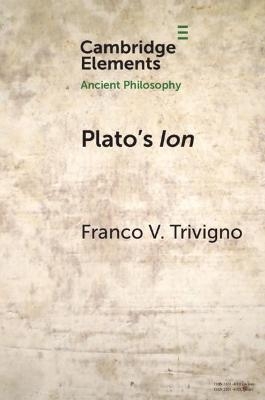
Plato's Ion
Poetry, Expertise, and Inspiration
Seiten
2020
Cambridge University Press (Verlag)
978-1-108-71345-0 (ISBN)
Cambridge University Press (Verlag)
978-1-108-71345-0 (ISBN)
This Element defends an interpretation of Plato's Ion on which its primary concern is with audience reception of poetry. The dialogue presents the character of Ion as a comedic figure, a self-ignorant fool whose foolishness is a function of his passive relation to Homer.
This Element defends an interpretation of Plato's Ion on which its primary concern is with audience reception of poetry. The dialogue countenances and rejects two models of poetic reception, the expertise model and the inspiration model, both of which make the audience entirely passive in relation to poetry; and it presents the character of Ion as a comedic figure, a self-ignorant fool whose foolishness is a function of his passive relation to Homer. In the end, this Element argues that, for Plato, critical engagement is the proper way for audiences to treat poetry. This view holds open the possibility that poetry may express some truths without thereby endorsing the idea that poets are experts who have authoritative knowledge.
This Element defends an interpretation of Plato's Ion on which its primary concern is with audience reception of poetry. The dialogue countenances and rejects two models of poetic reception, the expertise model and the inspiration model, both of which make the audience entirely passive in relation to poetry; and it presents the character of Ion as a comedic figure, a self-ignorant fool whose foolishness is a function of his passive relation to Homer. In the end, this Element argues that, for Plato, critical engagement is the proper way for audiences to treat poetry. This view holds open the possibility that poetry may express some truths without thereby endorsing the idea that poets are experts who have authoritative knowledge.
1. Introduction; 2. The Opening Scene; 3. The Expertise Model of Poetic Reception; 4. The Inspiration Model of Poetic Reception; 5. The Problem of Beauty; 6. The Foolishness of Ion; 7. The Critical Engagement Model; 8. Conclusion; Bibliography.
| Erscheinungsdatum | 21.10.2020 |
|---|---|
| Reihe/Serie | Elements in Ancient Philosophy |
| Zusatzinfo | Worked examples or Exercises |
| Verlagsort | Cambridge |
| Sprache | englisch |
| Maße | 151 x 230 mm |
| Gewicht | 130 g |
| Themenwelt | Geisteswissenschaften ► Philosophie ► Allgemeines / Lexika |
| Geisteswissenschaften ► Philosophie ► Philosophie Altertum / Antike | |
| Geisteswissenschaften ► Sprach- / Literaturwissenschaft ► Anglistik / Amerikanistik | |
| Geisteswissenschaften ► Sprach- / Literaturwissenschaft ► Literaturwissenschaft | |
| ISBN-10 | 1-108-71345-9 / 1108713459 |
| ISBN-13 | 978-1-108-71345-0 / 9781108713450 |
| Zustand | Neuware |
| Haben Sie eine Frage zum Produkt? |
Mehr entdecken
aus dem Bereich
aus dem Bereich
die letzten Jahre der Philosophie und der Beginn einer neuen …
Buch | Hardcover (2024)
Klett-Cotta (Verlag)
28,00 €
Gesundheitsschutz, Selbstbestimmungsrechte, Rechtspolitik
Buch | Softcover (2024)
Kohlhammer (Verlag)
39,00 €
Jenseits von Identität | Ausgezeichnet mit dem Leipziger Buchpreis …
Buch | Softcover (2023)
Ullstein Taschenbuch Verlag
13,99 €


